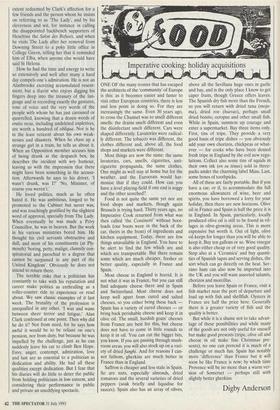ONE OF the many ironies that has escaped the architects
of the 'community' of Europe is this: as it becomes easier and faster to visit other European countries, there is less and less point in doing so. For they are increasingly the same. Even 30 years ago, to cross the Channel was to smell different smells: the drains smelt different and even the disinfectant smelt different. Cars were shaped differently. Lavatories were radical- ly different. The tobacco was different, the clothes different and, above all, the food shops and markets were different.
Most things are now the same: the same lavatories, cars, smells, cigarettes, anti- cigarette propaganda, the same clothes. One might as well stay at home but for the weather, and the Eurocrats would har- monise that if they could. How can you have a level playing-field if one end is soggy and the other scorched?
Food is not quite the same yet nor are food shops and markets, though again Brussels is trying hard. Thirty years ago, no Imperative Cook returned from what was then called 'the Continent' without boot- loads (our boots were in the back of the car, theirs in the front) of ingredients and kitchen equipment. Today, there are few things unavailable in England. You have to be alert to find the few which are and which are transportable. But there remain some which are much cheaper, fresher or better quality, especially in France and Spain.
Most cheese in England is horrid. It is not what it was in France, but you can still find adequate cheese there and in Spain and Switzerland. Most cheese does not keep well apart from cured and salted cheeses, so you either bring these back Spain has a variety of cured cheeses — or bring back perishable cheese and keep it in olive oil. The small, hardish goats' cheeses from France are best for this, but cheese does not have to come in little rounds to keep it in oil. You can cut the bigger bits, you know. If you are passing through mush- room areas, you will also stock up on a vari- ety of dried funghi. And for reasons I can- not fathom, gherkins are much better in France than in England.
Saffron is cheaper and less stale in Spain. So are nuts, especially almonds, dried tomatoes and the several varieties of dried peppers (soak briefly and liquidise for sauces). Spain also has an array of olives,
above all the Sevillana huge ones in garlic and bay, and is the only place I know to get caper fruits, though Greece offers leaves. The Spanish dry fish more than the French, so you will return with dried tuna (moja- ma), dried roe (huevas), perhaps small dried bonito, octopus and other small fish. While in Spain, summon up courage and enter a supermarket. Buy three items only. First, tins of tripe. They provide a very good basis of tripe dishes — you obviously add your own chorizos, chickpeas or what- ever — for cooks who have been denied fresh tripe in England by the evil new regu- lations. Collect also some tins of squids in their own ink (en su tintas) sold in three- packs under the charming label Miau. Last, some boxes of toothpicks.
All of these are fairly portable. But if you have a car, or if, to accommodate the full enormous allowances of wine, beer and spirits, you have borrowed a lorry for your holiday, then there are new horizons. Olive oil in France and Spain is half the price it is in England. In Spain, particularly, locally produced olive oil is still to be found in vil- lages in olive-growing areas. This is more expensive but worth it. Out of light, olive oil keeps for longer than you will be able to keep it. Buy ten gallons or so. Wine vinegar is also either cheap or of very good quality. Stop also at a `Ceramica' and buy quanti- ties of Spanish tapas and serving dishes, the sort which can go directly on the heat. Ser- rano ham can also now be imported into the UK and you will want assorted salamis, chorizos and morcillas.
Before you leave Spain or France, visit a fish market near the port of departure and load up with fish and shellfish. Oysters in France are half the price here. Generally there is a greater variety of fish and the quality is better.
But while it is a shame not to take advan- tage of these possibilities and while many of the goods are not only useful for oneself but make good presents (tripe, olive oil and cheese in oil make fine Christmas pre- sents), no one can pretend it is much of a challenge or much fun. Spain has notably more 'difference' than France but it will soon be like France is now; by which time Provence will be no more than a warm ver- sion of Somerset — perhaps still with slightly better gherkins.
Digby Anderson


















































 Previous page
Previous page